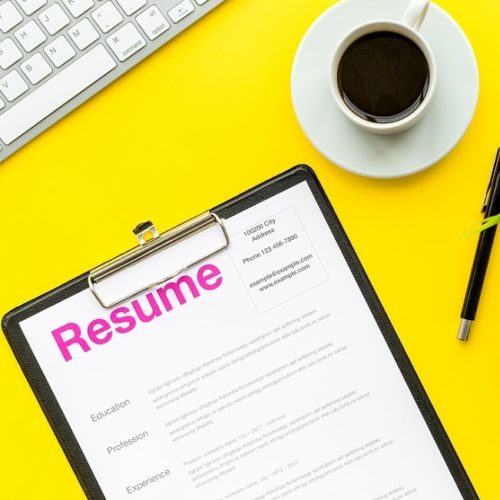
I have experienced being on both ends of the hiring process: as an applicant, I have seen the frustrations of applying to numerous jobs and putting up to an hour into each application only to never hear back, or to make it to the interview and then get ghosted.
As a hiring manager, I have seen first-hand the piles of resumes I received for just one position, then have had to begin the process of sorting through all of them to determine who would be the best candidate for the role.
As frustrating as it is as an applicant, it is equally frustrating as a hiring manager; I wanted the right candidate but also needed to fill the shifts in the pharmacy while looking, so what I really wanted was to fill the position quickly.
I was frustrated by the fact that I might have great applicants right under my nose but couldn’t tell because their resume was a mess.
Below are my top tips to make sure you make it at the top of the pile, and also my top tips I learned as an applicant trying to make it to the top of someone else’s pile:
List accomplishments:
I don’t know how many pharmacists and technicians I have had apply who list their job and then a mundane description of the job that tells me nothing about what they did. For someone coming from a chain retail pharmacy, it might look like this: “rang up customers, filled medications, cleaned shelves, assisted the pharmacist, and gave good customer service.” I know what a technician at a retail pharmacy does – you don’t need to tell me that!
It is OK to give a one sentence blurb of general duties, but then it should get into specific accomplishments on the job. Even familiarity with certain software systems could be helpful. Maybe it could look something like this: “Developed an in-depth knowledge of QS1 pharmacy dispensing software; received positive written customer feedback on two occasions despite working in a high-volume (2000+ Rx/week) environment; developed in-depth knowledge of third-party billing and internal pharmacy operations.”
Tailor your resume:
This is written in almost every article about resumes because it is true. If you really want that dream job you need to be thinking about how to make your resume specific to that role. What job skills or attributes do they list as top priorities? Are there things you have done in your current or previous roles that fit that description?
If so, they should go at the top when describing your accomplishments, so it is the first thing the hiring manager will see. Numerous articles discuss how little time a hiring manager will spend with your resume (if they even see it) and you want to make sure their eyes land on skills they are seeking.
Don’t be too discouraged by job descriptions:
It is very common for job descriptions to say that they want a specific number of years of experience or certain skills that you haven’t acquired yet. It’s also common for the hiring manager to have no idea what the job description says. If it looks like your dream job, and you can figure out how to relate your skills to the job, apply anyway!
I remember getting an interview for a healthcare products manager position that required an MBA (I am in school for an MBA, but don’t have it yet) and several years of experience in managing products (I have managed projects, but not product lines). I was surprised to get the call, but they were attracted to the fact I was a pharmacist, I had used their products before so was familiar with them as a customer, and had accomplishments that were relevant to their job.
The key is creating a resume for that role that will paint you in the best light for it.
Beware of ATS (applicant tracking system) scanners:
Ahh the resume robots. I had no idea about these until somewhat recently, but they will scan your resume for keywords that are also in the job description or that the hiring manager has listed as a priority and then give the hiring manager a list of candidates that are potentially the best fit for the job. If they have 50 candidates apply, I can guarantee they are not going to look at the last 30-40 resumes on this list, so if you don’t get past the ATS scanners you will not even be seen. If the ATS scanner can’t read your resume due to formatting, it will not be seen either. Here is a great article on ATS scanners that I highly encourage you to read if you are planning a career change.
For clinicians looking to partner with Barton Healthcare Staffing, we take all of the fear of ATS scanners out of the equation. Instead, your resume is sent to your dedicated recruiter, who in turn formats it properly for the client – if they have a specific requirement for formatting – and submit it on your behalf.
There are real humans involved in the entire process, so you don’t need to worry about “defeating” ATS scanners or lack of personal connection.
Consider hiring a resume writer:
Resume writers are good at formatting your resume to be sure it can be read by an ATS scanner yet still look good to a hiring manager, checking for errors, highlighting your accomplishments that are most relevant to the next role you are looking for, and more. It is inexpensive in comparison to how valuable your next dream job is and if you are serious about taking the next step in your career, I highly encourage you to look into using their services. I did hire a resume writer to focus my resume on medical writing rather than management and I think they did a great job; feel free to use it as an example when creating your resume or evaluating whether a resume writer is right for you.
Be sure there are no spelling or grammatical errors:
Last but certainly not least, your resume should not have spelling errors, run-on sentences, comma splices, misplaced modifiers, or anything else that makes it look like you didn’t proofread it. As a hiring manager, I forgave the first one and after the second one I threw it in the trash.
Good luck on your next job search!

